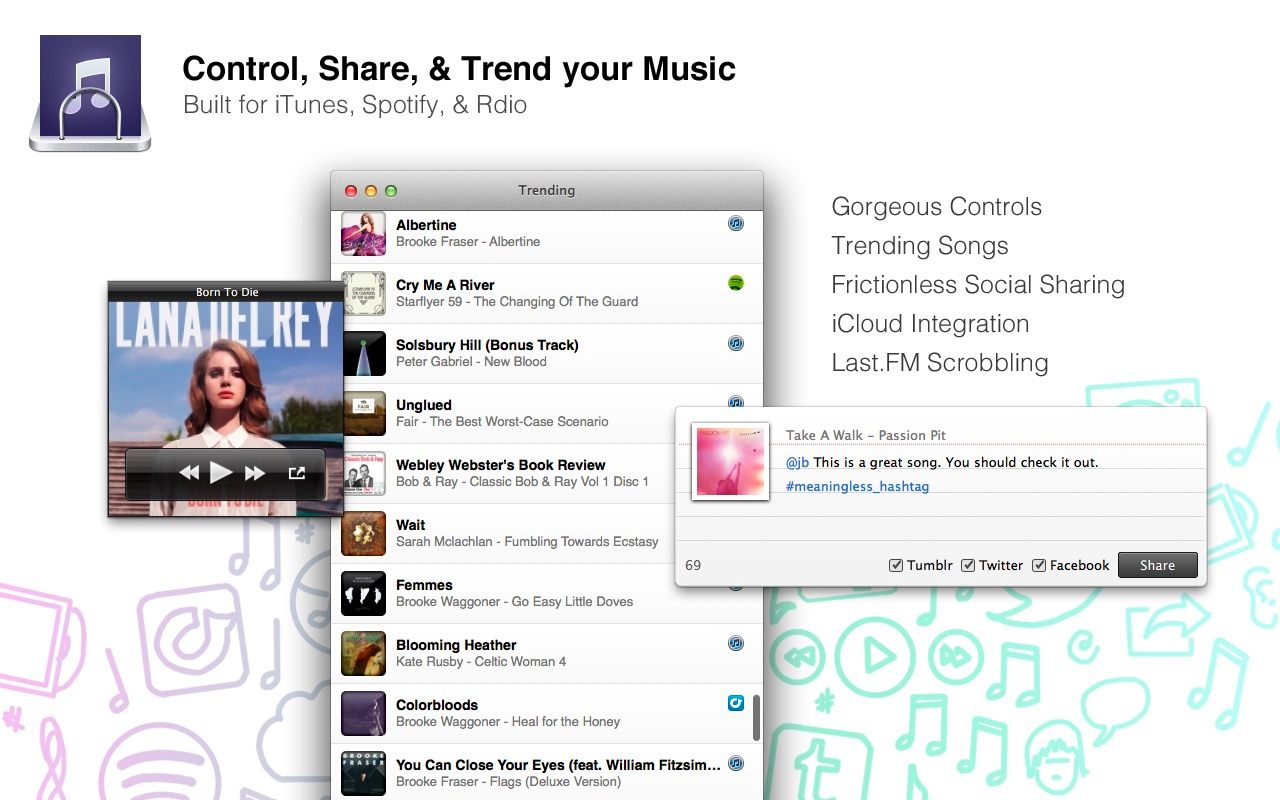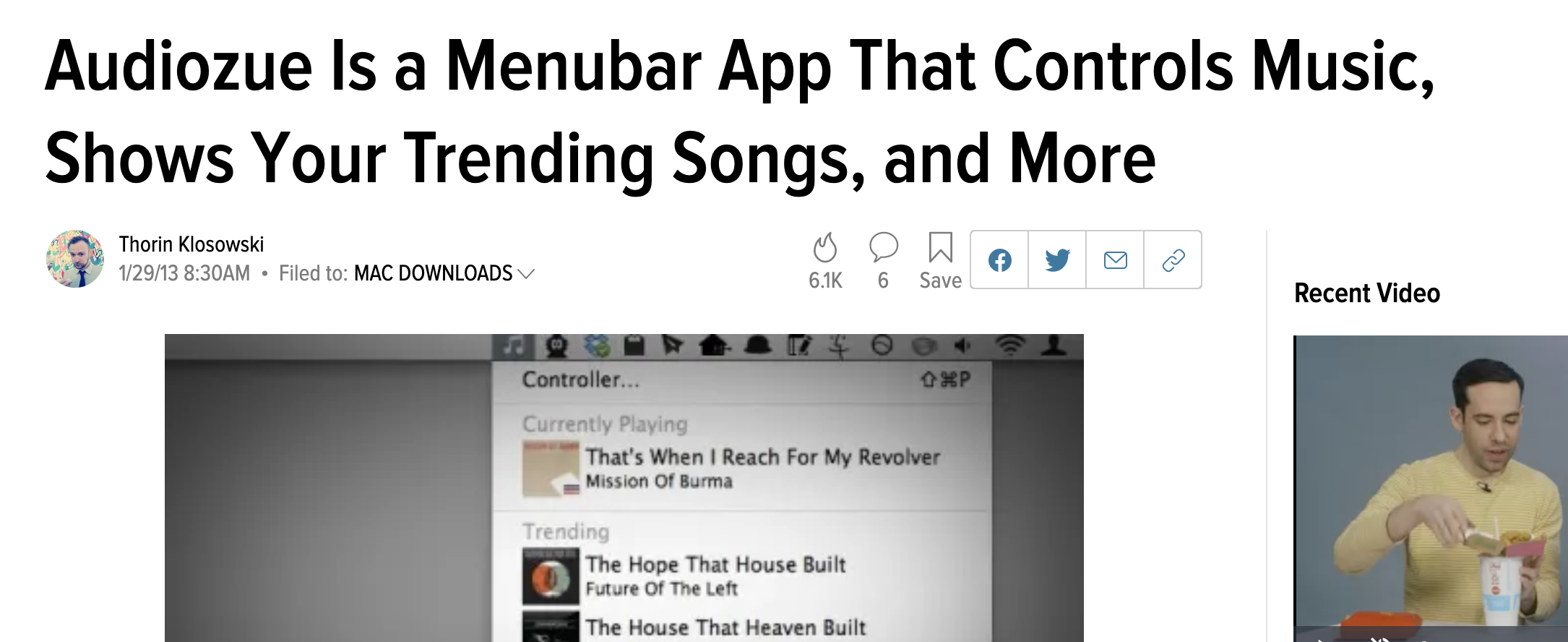03 March 2020
I’d previously released two apps with some success on the Mac App Store. For my next app I wanted to tackle music. I'd been hankering to do something social with music since I learned how to code. After some brainstorming I decided to build a music controller app (similar to CoverSutra and SkipTunes) that would work with all the different popular streaming services at the time (iTunes, Spotify, Rdio) and build an awesome leaderboard of your favorite songs based on what you listened to. Thus Audiozue was born.

My previous experience in launching Mac Apps on the App Store showed that they could make decent money and that it was way less competitive than the iOS app store. The key is to an app store strategy is to get the store editor's attention so they feature you and, with their help, climb to the top 10 in a specific category and stay there. Top 10 is key because that means you stay above the fold when people are browsing through categories. If you slip from 10 to 11 in the rankings, you take a huge visibility hit.
Audiozue meant I would need to fight for that top 10 position in the Music category. Based on the apparent success of other apps, it appeared that there was a market for apps like this and if I could become a perennial top 10 music app, I figured I could pull in about $1,000-$5,000 per month in passive income. Maybe even close to $10,000 on a good month if I was featured. Not bad cabbage.
The dev cycle was actually pretty quick considering how many features made it into the app. I made my first commit on Sep 20th and the app went live on the Mac App Store on Jan 30, 2013. That's about 3 months of native app development but this was also a side project. I had a full-time job so I could only do Audiozue development for about 10 hours per week. So overall, using back of the napkin math, I'd guess that 1.0 of Audiozue took about 120 hours of development time.


Apparently I was doing some beta testing with Twitter users too: https://twitter.com/audiozue But I don't remember any of that at all. Still it looks like I was beta testing from Nov through Jan.
Because this was my own personal project, I wasn't charging myself—but the rate for a good Mac developer could be anywhere from $75-$150/hr. Let's say that I hired a developer to do this. I would have invested about $12,000 in programming to get to 1.0.
$12,000$0One of my favorite part about working on Mac apps is the design. First, because there are so many amazing designers out there who never get to design for the Mac but can do great work. I did the UX/UI design for the app myself but I wasn't brave enough to the App Icon. So I hired someone.
After a few weeks of reviewing sketches, back and forth and more and more detailed renderings we got to the finished product:
$750I had a mailing list of about 12,000 people who had signed up for Audiozue information. Based on my past app launches I had some warm contacts with tech journalists who had written reviews of my work. I sent out a "soft-invite" to them, hoping to get featured on their site.

A note on doing PR for your app launch, it's actually pretty easy. I've had great results just writing personal emails to journalists and asking them to look at my app. Early/free access is the only thing I've ever offered.
Usually I send out a Press Kit with an embargo date but I didn't do that with Audiozue. I don't remember why but 2013 was a crazy busy year for me and I assume I felt too overwhelmed to coordinate all the launch dates with press.
For my mailing list of 12,000, I put together a more generic announcement email set to go out as soon as Audiozue was available in the Mac App Store. (12,000 is a lot of emails for an indie app launch. They came from a previous web-based version of Audiozue that I'd built and shut down. I don't think I'd have been able to build that list just from simple pre-launch marketing efforts.)
Finally I designed and built a website for the app over a weekend. I'm still pretty happy how this turned out. It's very circa 2012 but I feel like it does the job.
By the end of January we were approved by Apple (it took 10 days in 2012) and ready to launch. I hit "publish", refreshed the store for the next few hours, a sent out a bunch of emails to my press contacts and waited.
The coverage was ok. Some outlets that I was sure would cover me apparently weren't interested in my music controller app. But I did get featured in some outlets that I didn't expect. Here's the (still online) results of my PR efforts:

A french outlet was the first to pick up the story:
LifeHacker featured Audiozue in two of their sites:
A now-defunct tech/music site called Evolver.fm wrote an article:
And I got a nice shout-out on Mashable
There were probably a few other outlets that covered Audiozue but those have now vanished from the internet.
Meh. Despite the press and my 12,000 strong mailing list, Audiozue struggled to get to the top of the music category, peaking at 7th pace. This is where I realized that didn't have a hit on my hands.

Audiozue only stayed in the Top 10 of the Music category for a few days before dropping into the abyss.
The biggest marketing failure with Audiozue was that, for whatever reason, the app store editors didn't feature it in the "New and Noteworthy" category. That list of eight apps was basically the first thing you saw when you opened the Mac App Store for two weeks. It was a guarantee of people checking out your app. All of my previous apps had been listed in "New & Noteworthy" but Audiozue was passed over.
I assumed that getting featured in New & Noteworthy was a highly rigorous process and that I didn't get because Audiozue was not truly "Noteworthy". But a few years later I met the Mac editor team at WWDC and it was like two people. I asked them about it and they were like "Oh, we must have missed it. Next time just email us and we'll put it in there." 🤦♂️I'm pretty sure I lost a lot of money by not being more persistent here.
Here's the final number on Audiozue.
31 sales60 sales (This was the week LifeHacker wrote their article)17 sales. (This was where we vanished from the top 10. My 12,000 person mailing list blast had zero impact on sales.)10 sales.I only made $1,600 in sales for all of 2013.

In Nov of 2014, almost two years after I launched the app, I pulled it from the store. I was completely focused on Droplr and didn't have the bandwidth to even ship bug fixes.
| Item | Amount |
|---|---|
| Design | $750 |
| Development | |
| Marketing | $100 |
| Total | $850 |
| Amount | |
|---|---|
| 2013 (Gross) | $1,600 |
| 2014 (Gross) | $516 |
| Apple's Cut | -$635 |
| Net Revenue | $1,481 |
Overall Audiozue was not a success and didn't hit the goals that I'd hoped it would. In fact, it was the worst performing app that I ever built. There just wasn't enough of a market for a controller for different streaming services and despite a decent launch, it couldn't maintain momentum and quickly sank into app store obscurity. From a raw units sold standpoint (approximately 500), if it had generated recurring revenue instead a one-time purchase cost, perhaps it could have been a viable venture.
If I had actually hired a developer it would have been a huge loss for me. As it was, because I did the dev and lots of the design myself, it was a technically profitable venture but only to the tune of $700. That's a pretty bad investment of programming time.
Despite the good press at launch, gorgeous icon, and positive feedback from users. Audiozue was not a viable business or source of revenue and that became apparent within about 30 days of its debut.
Next up, I'll write about MarkDrop, the markdown editing app that did a little better over its lifetime.
🤓 If you want to follow along with me as I build a static web host for designers, sign up for the Wunderbucket beta. Let me know that you came from this article and I'll be sure to put you to the front of the line.